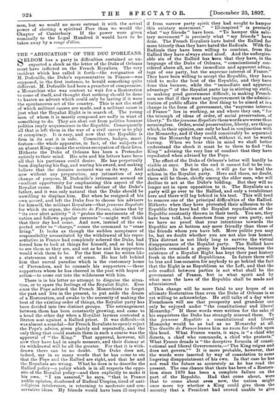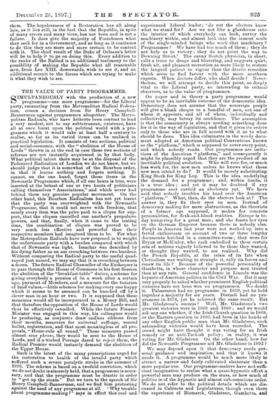THE "ABDICATION" OF THE DUC D'ORLEANS.
SELDOM has a party in difficulties sustained so un- expected a shock as the letter of the Duke of Orleans must have inflicted on the French Royalists. The very incident which has called it forth—the resignation of M. Dufeuille, the Duke's representative in France—was supposed, in the first instance, to herald something quite different. M. Dufeuille had been a preacher of compromise, a Monarchist who was content to wait for a Restoration to come of itself, and thought that nothing should be done to hasten an advent which could only be lasting if it were the spontaneous act of the country. This is not the stuff of which militant causes are made, and a militant cause is just what the Royalist Right is in search of. The young men of whom it is mostly composed are sadly in want of something to do. They are shut out from politics because politics imply acquiescence in the Republic. Consequently all that is left them in the way of a civil career is to play at conspiracy. It is easy, and now that the Republic is firm in its seat it is safe. Committees, badges, mani- festoes—the whole apparatus, in fact, of the subjects of an absent King—make the serious occupation of their lives. Hitherto the Duke of Orleans has been a Pretender entirely to their mind. His acts and his letters have been all that his partisans could desire. He has perpetually been displaying his flag, and waving his sword, and making believe that the decisive moment was on its way. And now without any preparation, any intimation of any change of purpose, M. Dufeuille's retirement seemed an excellent opportunity for emphasising this aspect of the Royalist cause. He had been the adviser of the Duke's father, and it was only natural that the Duke should be unwilling to displace him. But when he resigned of his own accord, and left the Duke free to choose his advisers for himself, the militant Royalists—that jeunesse Royaliste for which its organ, the Gazette de France, claims that by " its ever alert activity " it " probes the sentiments of the nation and follows popular currents "—might well think that their day had come. And now, instead of the ex- pected order to " charge," comes the command to " cease firing." It looks as though the sudden acceptance of responsibility necessitated by the withdrawal of his repre- sentative in France had completely sobered the Duke, had forced him to look at things for himself, and so led him to see them as they are, and not as he and his supporters would wish them to be. For the first time he writes like a statesman and a man of sense. He has left behind him that unreal paradise which is the customary home of Pretenders, and he counsels his supporters—those supporters whom he has cheered in the past with hopes of action—to come out into the wilderness with him.
There is in his letter no attempt to disguise the situa- tion, or to spare the feelings of the Royalist Right. Ever since the Pope advised the French Monarchists to forget the past and live in the present, to put aside the dream of a Restoration, and awake to the necessity of making the best of the existing order of things, the Royalist party has been divided into two distinct groups. The estrangement between them has been constantly growing, and came to a head the other day when a Royalist layman contested a Breton seat against a Rallied priest. It was difficult—it was almost a scandal—for French Royalists to openly reject the Pope's advice, given plainly and repeatedly, and the only thing that could sustain them in such a course was the approval of " the King." That approval, however, till now they have had in ample measure, and their dismay at its withdrawal will be all the greater. For that it is with- drawn there can be no doubt. The Duke does not, indeed, say in so many words that he has come to see that the Pope and the Rallied are right, and that he and the Royalists are wrong. What he does is to describe the Rallied policy—a policy which is in all respects the oppo- site of the Royalist policy—and then explicitly to make it his own. " I am assured," he says, "that in France public opinion, disabused of Radical Utopias, tired of anti- religious intolerance, is returning to moderate and con- servative ideas. My friends would have been ill-inspired if from narrow party spirit they had sought to hamper this salutary movement." " El-inspired " is precisely what " my friends " have been. "To hamper this salu- tary movement" is precisely what " my friends " have done. The French Royalists have hated the Rallied far more bitterly than they have hated the Radicals. With the Radicals they have been willing to combine, from the Rallied they have always stood aloof. And the unforgive- able sin of the Rallied has been that they have, in the language of the Duke of Orleans, " conscientiously con- sidered above all, not the immediate and apparent advan- tage of one party, but the supreme interest of France." They have been willing to accept the Republic, they have tried to make the best of the Republic, and they have done this because, while the "immediate and apparent advantage " of the Royalist party lay in stirring up strife, in making good government difficult, in making French- men see that if they want any improvement in the adminis- tration of public affairs the first thing to be aimed at is a change in the form of government, the "supreme interest of France" lies in working, as and where they can, " for the triumph of ideas of order, of social preservation, of liberty." To thejeunesse.Royalisfe these words are worse than meaningless. Order, social preservation, liberty, are things which, in their opinion, can only be had in conjunction with the Monarchy, and if they could conceivably be separated from the Monarchy they would, without it, not be worth having. When we bear this in mind we shall better understand the shock it must be to them to find "the King" advising the very line of conduct that they have repudiated when advised by the Pope.
The effect of the Duke of Orleans's letter will hardly be visible at once. But in the end it cannot fail to be con- siderable. In the first place, it will go far to heal the schism in the Royalist party. Here and there, no doubt, there will be those, chiefly among the older men, who will decline to act at the Duke's bidding. But they will no longer act in open opposition to it. The Royalists as a party will go over to the Rallied, and only a recalcitrant here and there will lag behind in his tent. This will tend to remove one of the principal difficulties of the Rallied. Hitherto when they have protested their adhesion to the Republic they have had the Royalist repudiation of the Republic constantly thrown in their teeth. You are, they have been told, but deserters from your own party, and we have no proof that your intentions towards the Republic are at bottom any more friendly than those of the friends whom you have left. More politic you may be, but we doubt whether you are not also less honest. This distrust is not likely long to survive the virtual disappearance of the Royalist party. The Rallied have hitherto remained a group by themselves, because the existence of a Royalist Right has kept their past history fresh in the minds of Republicans. In future there will be less and less occasion for anybody to go behind the fact that the Right is as Republican as the Left, and that the sole conflict between parties is not what shall be the government of France, but in what spirit and by what men the laws of the Republic shall be made and administered.
This change will be more fatal to any hopes of an ultimate Restoration than even the Duke of Orleans is as yet willing to acknowledge. He still talks of a day when Frenchmen will see that prosperity and grandeur can only be enjoyed under "the constitutional and liberal Monarchy." If these words were written for the sake of his supporters the Duke has strangely misread them. To the jeunesse Royaliste a constitutional and liberal Monarchy would be as bad as no Monarchy at all. The Gazette de France leaves him no room for doubt upon this head. What France wants, it says, is " a chief who directs, a chief who commands, a chief who protects." What Fiance dreads is "the deceptive formula of consti- tutional and liberal Governments,—' The King reigns and does not govern." It is more probable, however, that the words were inserted by way of consolation to some lingering disappointment of his own. In that case he has not read the future as accurately as he has read the present. The one chance that there has been of a Restora- tion since 1870 has been a complete failure on the part of the Republic. Had that come about, were that to come about even now, the nation might once more try whether a King could give them the security that a President had Droved unable to give them. The hopelessness of a Restoration has all along lain, as it lies still, in the fact that the Republic, in spite of many errors and many vices, has not been and is not a failure. It does give the majority of Frenchmen what they seek for in a Government, and so long as it continues to do this they are more and more certain to be content with it. The chief result of the Duke of Orleans's letter will be to help it to go on doing this. Every addition to the ranks of the Rallied is an additional testimony to the possibility of making the Republic what all reasonable men, from Leo XIII. downwards, wish to see it, and an additional recruit to the forces which are trying to make it what they wish to see.



































 Previous page
Previous page